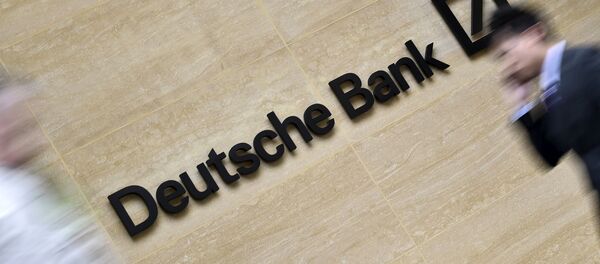Kristian Rouz – Deutsche Bank, a global financial institution that has recently faced regulatory challenges in the US and the overall unfavorable business conditions, resulting in a murky outlook regarding its sustainability, is deemed ‘too important’ to the German government to let it collapse, Chief Investment Officer of the Munich-based Allianz Global Investors, Andreas Utermann, said.
Deutsche Bank is facing $14 bln in fines imposed by the US Department of Justice for the malpractices over several previous years, and the potential necessity to raise that capital has negatively affected the lender’s positioning in the global market, with its stock sliding dramatically in the recent weeks to its historic lows. In addition to the bank having failed the Federal Reserve’s late-July stress-test, the most recent struggle has raised questions over Deutsche Bank’s sustainability and even a possible collapse.
“I don’t buy at all what’s coming out of Germany in terms of Germany not wanting to step in ultimately if Deutsche Bank was really in trouble,” Utermann of Allianz told Bloomberg TV on Monday. “It’s too important for the German economy.”
"This is a very political issue and I think, sadly, it's going to be politics and not share prices that dictates the market's view of Deutsche," Lionel Laurent of Bloomberg Gadfly said.
Meanwhile, further complicating the outlook for Deutsche Bank, the Basel Committee on Banking Supervision was reported as considering new regulations aimed at tightening bank risk assessment.
In such an environment, investors are reducing their exposure to risks associated with Deutsche Bank, undermining the lender’s longer-term resilience.
“The government will have to step in, should this become a self-fulfilling prophesy with the share price going down too low,” Utermann of Allianz reiterated.
Deutsche’s stock dropped 6.9pc on Monday only. Coupled with the slowdown in the German economy and the overall turbulent outlook for the Eurozone, the negative consequences might be very serious to the lender. As banking sector regulations have tightened substantially on a global scale in the recent years, Deutsche Bank would find it extremely hard to raise capital without a partial asset selloff, which will inevitably result in a contraction of its scale of global outreach, regardless of whether the governmental bailout arrives or not.




